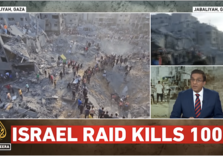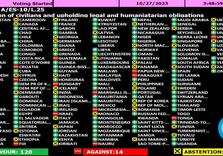Correspondent Luke Beasley interviewed Trump supporters at Trump's recent event in South Carolina and it was completely out of control
UNDER CONSTRUCTION - MOVED TO MIDDLEBORO REVIEW AND SO ON https://middlebororeviewandsoon.blogspot.com/
Correspondent Luke Beasley interviewed Trump supporters at Trump's recent event in South Carolina and it was completely out of control
What happens if President Joe Biden wins reelection in 2024. David Shuster interviews Trump supporters outside a New Hampshire rally.
Israel in Search of its Hiroshima: Massive Bomb Wipes out 20 Apt. Buildings, Kills, Wounds 400 Civilians Ann Arbor (Informed Comment) – In one of the biggest massacres it has so far committed, the Israeli Air Force on Tuesday bombed the Jabaliyaa refugee camp in Gaza, killing or wounding at least 400 persons and destroying the Block Six residential complex, felling 20 buildings. More victims are believed to be under the rubble. […] |
US Stands Isolated in backing Gaza Massacre ( Code Pink ) – On Friday, October 27, the nations of the world voted in the UN General Assembly, by a vote of 120 to 14, for an “immediate, durable and sustained humanitarian truce leading to a cessation of hostilities” in Gaza. The resolution was sponsored by the government of sometime U.S. ally King […] |
What’s not being Said: What War does to the Nations that Fight It ( Tomdispatch.com ) – Reacting to the terrorist attacks by the Palestinian militant group Hamas that killed more than 1,400 Israelis, Americans have been remarkably focused on whether we should support Israel or the residents of Gaza. In either case, we act as if Israel’s only possible decision was whether or not to launch a […] |
Our affiliates at Lincoln Democracy Institute released a new ad today to alert Americans to No Labels’ latest dangerous scam to upend the 2024 election. No Labels' plan is to give the GOP a chance to do what they couldn't in 2020 – decide the next Presidential election.
|
|
|
|
|
|
War is hell. Always. And it is a special kind of hell when it ensnares innocent civilians, especially children. Anyone with a soul and a conscience must face what is happening now in Gaza and what happened on October 7 in Israel with a sickening heartache. The stories. The pictures. The tally of loss and misery. It is unbearable. Every instinct of our common humanity should desperately want the bloodshed to stop. Immediately. Peace is always preferable. These sentiments should have no qualification, but sadly our imperfect and tortured world — buffeted by history, injustice, and hatred — sometimes creates situations where there is only tragedy. Not every problem has an easy answer — or even an answer at all. It is fitting that the legendary tale of the Gordian Knot took place in the Middle East. For millennia, the region has been a tangle of war-torn ambition and animosity. It has been the crossroads of continents, the cradle of religions, and the graveyard of would-be empires. These are the ingredients for conflict. To walk the land is to stride across layer upon layer of civilizations long gone and largely forgotten. The ruins teach hard lessons about hubris, exultation, and defeat. They are interwoven narratives that often begin and end in war. You can’t tell a story about the Middle East without reckoning with what preceded it. History always creeps in. In this current conflict, we can once more hear the thundering echoes of the past. Where do we begin? It’s a deceptively easy question to ask, but the choice one makes shapes everything that comes next. Do we begin centuries ago? Or more recently? Do we talk about the Holocaust? The partition? Palestinian statehood? The failed peace deals? The settlements? The assassinations? The role of the Arab states? Iran? Hezbollah? The failures of Israeli governments? Antisemitism? Double standards? And on and on. Whatever framing we choose, there is always something important that lies outside our view. But we can be sure that whatever era we choose to focus on will include strife and death. And we can be doubly sure that it will be seen through radically different lenses, depending on whom we ask. Beware of anyone who speaks in absolutes about the Middle East, especially when it comes to the certainty of their beliefs. “What should be done?” is a question that should prompt self-reflection, not bombastic lectures. The best military and political leaders try to challenge their own preconceptions and biases. They constantly ask themselves, “What am I missing?” We can say unequivocally that no country would accept murderous terrorists on its border. And we know that the barbarity of Hamas cannot be allowed to continue if we want to have a world of peace. We also know that Israel’s trying to eliminate Hamas with bombs and tanks in urban combat means levels of death — especially of civilians — that are staggering and will only get worse. These are people with nowhere to go. This loss is morally excruciating. It also could destabilize the region even further by sparking new fronts of war and cycles of retaliation. To those who say Israel should stop, we should ask what that means for Hamas. Can you say that a country has a right to defend itself, and then say it can’t do what it believes to be necessary to protect its citizens from terrorism? To those who say Israel should keep going, we should ask what that means for all those trapped in Gaza. What about their lives? Can you say you are fighting terrorism, and then risk radicalizing more people by killing their loved ones? We can lose a full understanding of the horrors of a war once it fades into the history books. Immediacy and gruesomeness can be sanitized by the passage of time. Fatalities become round numbers, and often more attention is paid to the sweep of geopolitics than the details of the battlefield. As generations pass, we lose forever the knowledge of what it was like to live through the wars of the past. But even wars that we consider just in retrospect — like the fight against the Nazis — led to mass civilian deaths. As did the fights to eliminate Al Qaeda and ISIS. So-called wars of “necessity” are still replete with tragedy. There are also the lessons from places like Afghanistan and Iraq, not to mention Vietnam, where we can see that the decision to commit to a full-scale fight turned out to be counterproductive to American security. The best we can hope for in a time of no good options is leaders who understand that we live in a world of conflict where compromise is hard but ultimately essential. Wisdom requires constantly reevaluating and readjusting one’s strategy in service to long-term goals. Military campaigns end. When this one does, what will have been the cost? What will follow? What will remain? What will be forever changed? The answers to these questions are currently unknowable, but they will be the means by which this era is judged. Wars are fought in the present tense, but their full impact emerges only in the future. In the meantime, all too often, there is only tragedy. |
LOTS OF POSTS IGNORED BY BLOGGER..... ALL POSTS ARE AVAILABLE ON MIDDLEBORO REVIEW AND SO ON Today in Politics,...
